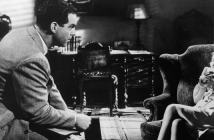
Millennium Mambo (2001)
Cast: Hsiang Hsi, Kuei-Ying Hsu, Annie Shizuka Inoh
Directors: Hsiao-Hsien Hou
Country: Taiwan | France
Genre: Drama
Website: TIFF
Editor’s Notes: The following review is part of our coverage for TIFF’s Good Men, Good Women: The Films of Hou Hsiao-hsien. For more information on upcoming TIFF film series visit http://tiff.net and follow TIFF on Twitter at @TIFF_NET.
Vicky (Qi Shu), the twenty-something at the center of Hou Hsaio-Hsien’s Millennium Mambo, is stuck in a rut. Long after dropping out of high school, and far from any reasonable, sustainable lifestyle (which would hypothetically include gainful employment, and hypothetically not filled with hard drugs and a controlling, abusive boyfriend), Vicky is halfway to nowhere. She hasn’t any particular vision or dream about her future, with the majority of her mental capital claimed by nightclubs and Hao-Hao (Tuan Chun-hao), the boyfriend who wouldn’t let her leave even if she ever decided she really wanted out.
… the film as a whole feels desperately out of sync, halfway between the final product released in 2001 and the probable conceptualization of the project in the head of director Hou Hsaio-Hsien.
Like Vicky, the film as a whole feels desperately out of sync, halfway between the final product released in 2001 and the probable conceptualization of the project in the head of director Hou Hsaio-Hsien, which likely would have resembled a modern Terrence Malick film. Millennium Mambo opens on the girl as she canters across a pedestrian bridge in slow-motion, looking back at the camera playfully as a voiceover (her own) narrates from 10 years into the future. Her voice is always calm and equipped with a touch of perceived wisdom, giving a wry sense of optimism to Vicky’s downtrodden life we explore with increasing discomfort. But this relationship between the narrative guide and the film itself is tenuous at best, as it disappears for large tracts of the film right as the story begins to lose steam.

However, the narration is not completely ill-conceived; similar to Hou’s other works, the chronology of Millennium Mambo is largely unimportant, or at least is not emphasized. Nearly twenty minutes after Vicky explains the abusive nature of her past with Hao-Hao, the first physical altercation actually takes place. It’s hard not to think that if the story remains in their apartment, focusing more wholly on their unhealthy dependence on each other, Mambo might keep the momentum it gains from the first half. Their fights, her journeys to the nightclub, and his drug-addled power trips are all captured using Hou’s signature long-takes, the camerawork being a particularly strong technical aspect of the film.
… much of the film zeroes in on the tangible, with Hou’s previous tendencies of using wide frames stifled, instead focusing on corks, champagne glasses, and drug paraphernalia, objects which are the fount of Vicky’s inertia.
And this is perhaps no surprise at all, with Hou’s past as a minimalist filmmaker, both in narrative and in camera movements, putting him into the stratosphere of some of the best world directors. The subject matter is familiar territory as well, with many of Hou’s previous films (Dust in the Wind, A Summer at Grandpa’s) focusing on times of change in the lives of the subject in question. Indeed, one of the more powerful moments in Millennium Mambo is when Vicky, trying for once to project a life beyond Hao-Hao, realizes how empty the fringes of her life have really become. Her sense of adventure has been whittled down repeatedly with the controlling hand of Hao-Hao, and even a supportive (if slightly shady) new flame Jack (Jack Kao) can’t quite help steer her to a sustainable life of self-support.
Maybe this was purposeful. The more time Vicky spends out of her head, reflecting on her circumstances with Hao-Hao or redefining what happiness even means to herself, the closer the film comes to drawing any profound conclusions about maturing (such is why the voiceovers, which have some semblance of sagacity, are so noticeable when they’re absent). Unfortunately, much of the film zeroes in on the tangible, with Hou’s previous tendencies of using wide frames stifled, instead focusing on corks, champagne glasses, and drug paraphernalia, objects which are the fount of Vicky’s inertia.
Hou has built up his credibility in the film community thanks to his unforgettably gorgeous technical and narrative choices, for decades perfecting his strengths as a dramatic director. Millennium Mambo certainly has the touches of a true master, but rarely rises above a half-baked concept which becomes muddled in an incomplete character arc. There’s plenty to keep our attention throughout, but the pieces all add up to something far less grand than we would’ve hoped.
Millennium Mambo certainly has the touches of a true master, but rarely rises above a half-baked concept which becomes muddled in an incomplete character arc. There’s plenty to keep our attention throughout, but the pieces all add up to something far less grand than we would’ve hoped.



